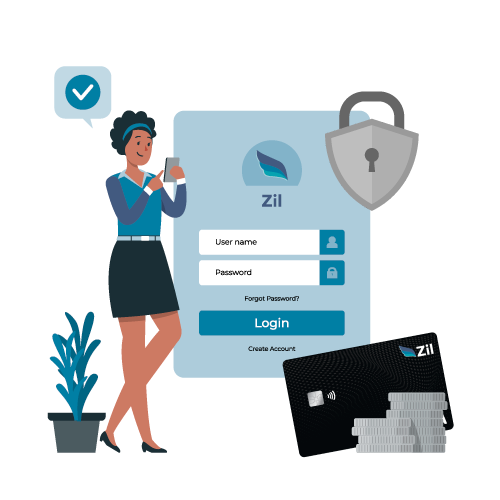Best banking checking accounts are deposit accounts that allows withdrawals and deposits at a financial institution. Checking accounts, also known as demand or transactional accounts. They are very liquid and can be accessed via checks, automated teller machines, and electronic debits, among other methods. Zil.US checking account allows multiple withdrawals and unlimited deposits.
If you are looking for a checking account with zero monthly maintenance fee or service charges, we’ve got what you need! Anyone who needs to make frequent withdrawals or transactions from their bank account should open a checking account. Setting up a checking account is usually very simple: you can apply online or in person at Zil.US and have a checking instantly.
Are Checking Accounts Convenient?
Zil.US has the best checking account to make your business banking accounts easy. Online checking accounts are more convenient than keeping your money in a traditional bank. With a computer or Smartphone, you can open an online checking account, check your balance, pay bills, and transfer money between accounts without ever leaving your house.
You can even deposit a check or cash without physically visiting a branch. Smartphone apps allow you to deposit a check by photographing both sides of it. Furthermore, many online banks have agreements with ATM companies that allow customers to make cash deposits using their machines.
Online Checking Accounts: More Benefits at Lower Fees
Online banks have lower overhead than traditional banks, and most pass those savings on to their customers through higher yields and lower fees. Online banks can offer checking accounts with the best APYs and higher. Another significant advantage of online banking is its low fees, which result from overhead savings passed on to the consumer.
Is a Checking Account a Card?
A checking account is not the same thing as a card. A checking account is a bank deposit account that allows for cash withdrawals and deposits. Checking accounts are a person’s primary source of funds on a daily basis, allowing cash to be withdrawn or deposited and various payments to be made. Most checking accounts nowadays include a card linked to the account. After that, the card can be used to make electronic payments or withdraw cash from an ATM.
What Are the Different Types of Checking Accounts?
Regular checking accounts, premium checking accounts, student checking accounts, senior checking accounts, interest-bearing accounts, business checking accounts, and rewards checking accounts are some of the different types of checking accounts. Each of these has different features or limits on certain features, such as minimum deposit amounts, transaction fees, ATM fees, and overdraft protection.
What Is the Difference Between a Checking Account and a Savings Account?
A checking account is aimed to be used for day-to-day cash requirements. It is an individual’s primary source of funds from which cash can be withdrawn for spending or payment. A savings account is intended to save money rather than spend it. Savings accounts can also earn interest on money deposited, whereas checking accounts do not. An interesting thing about checking account is Zil.US has no monthly withdrawal limits, whereas checking accounts have unlimited withdrawals.
Why Checking Accounts
Zil.US checking account has high liquid transaction with a bank or other financial institution that allows the holder to make deposits and withdrawals. Checking accounts, as opposed to less-liquid savings or investment accounts, are intended to be used daily and allow multiple deposits and withdrawals.
The tradeoff for increased liquidity is that checking accounts provide little interest or other benefits to holders. Money can be deposited into your checking account at banks and ATMs via direct deposit or another electronic transfer. You can withdraw money from banks and ATMs, write checks, or use electronic debit or credit cards linked to their accounts to withdraw money.
It’s critical to keep track of checking account fees, which are charged for overdrafts. Some banks also require you to keep your account balance above a certain threshold. No-fee checking accounts are becoming more common, and choosing the bets one will help you save money on your daily banking expenses.






